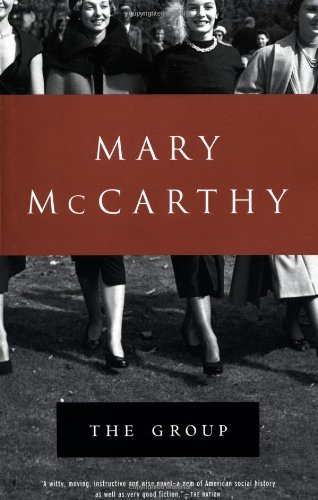Mad Men Book Club -- The Group
This week's Mad Men book club pick is The Group by Mary McCarthy. This story of several friends making their way through love and life after graduating from Vassar in the early 1930s was a bestseller in 1963. Here's my take on the book in context:
In Mad Men
The Group appears in Season 3 of Mad Men. It's Betty's book, and this makes sense because Betty would have seen herself, a Bryn Mawr graduate, in the Vassar girls who star in the novel. Betty reads the book in the bathtub, alone at home while Don is out having one of his many affairs. Later on in this episode, Betty finds a key to Don's private study drawer and discovers his secrets. It's possible that this tale of women who are sometimes independent and powerful and other times over-dependent on the men in their lives spurred Betty on to acting with power as she confronted Don.
In the 60s
The Group was a bestseller in 1963 and very controversial for its frank discussions of sex, homosexuality, contraception, abuse, psychoanalysis, Communism, and other taboo topics. What is perhaps most striking is that all this controversial activity happens before World War 2. The baby boomers were certainly not the first to champion free love and free thinking! (After all, the generation in this book is the generation of Roger Sterling, who is more bohemian than lots of the younger people on Mad Men). The other striking aspect of this work's pre-war setting is the career and education ambition of all the women in the novel. Women's liberation was on a steady uptick prior to World War 2. After the war, jobs held by women at home were promptly reallocated to men. (In The Feminine Mystique, Betty Friedan alludes to this change in depictions of women post-War, noting that in novels, short stories, and women's magazines prior to WW2, women were frequently depicted as interested in careers; post-WW2, the focus for women shifted to home and family.) The Group provides a helpful framework through which to view the regression of the women's movement in the 1950s, showing that the ideas of the sixties were not just a backlash against some version of "tradition," but a natural continuation of a movement begun a generation earlier.
Today
As with The Best of Everything, modern women can relate to the struggles of the women in The Group, no matter how different our lives may seem today. Of course the struggles of love, career, and family never really die, but what was most interesting to me in light of today was the discussion about childbirth and parenting. At one point, one of the characters has a baby and her Doctor husband wants her to fly in the face of the day's wisdom and breast-feed her child. Her decision causes such a stir that her journalist friend asks her to write a piece for Reader's Digest about the experience. Later, the same mother runs into another new-mother friend who flaunts her own unconventional parenting techniques, which make mother #1 so uncomfortable that she avoids that friend in the future. This whole scenario sounds so familiar in our world of deeply-held beliefs about natural childbirth vs. medication, co-sleeping vs. separate sleeping, picking up a child when she cries vs. letting her "cry it out," etc. Even with all we've learned in the intervening years, how to raise children is still one of the most controversial discussion points for any group of women, and, despite the lack of social media and mommy blogs in 1935, child-rearing was a divisive topic then, too.
The book was more graphic in some parts than I expected (turns out, people had sex back then, too :)), but the descriptions were delivered in almost a detached, matter-of-fact way. Still, it's something to watch out for. All in all, I enjoyed The Group. It's entertaining, witty, a good window into life for the women of my grandmother's generation, and a good mirror for the women in mine.
Join us next week for the fitting final installment in our series, The Last Picture Show.





Comments
Post a Comment
Thanks for leaving your kind and thoughtful comments.